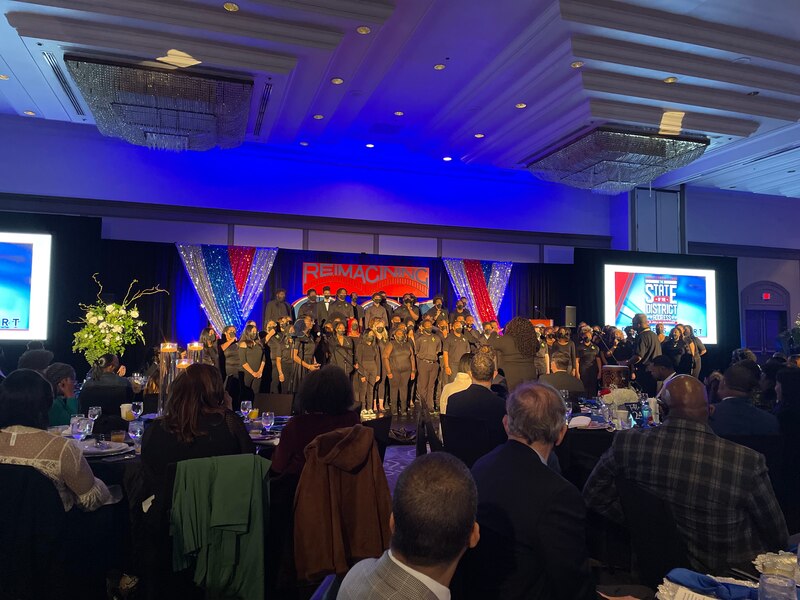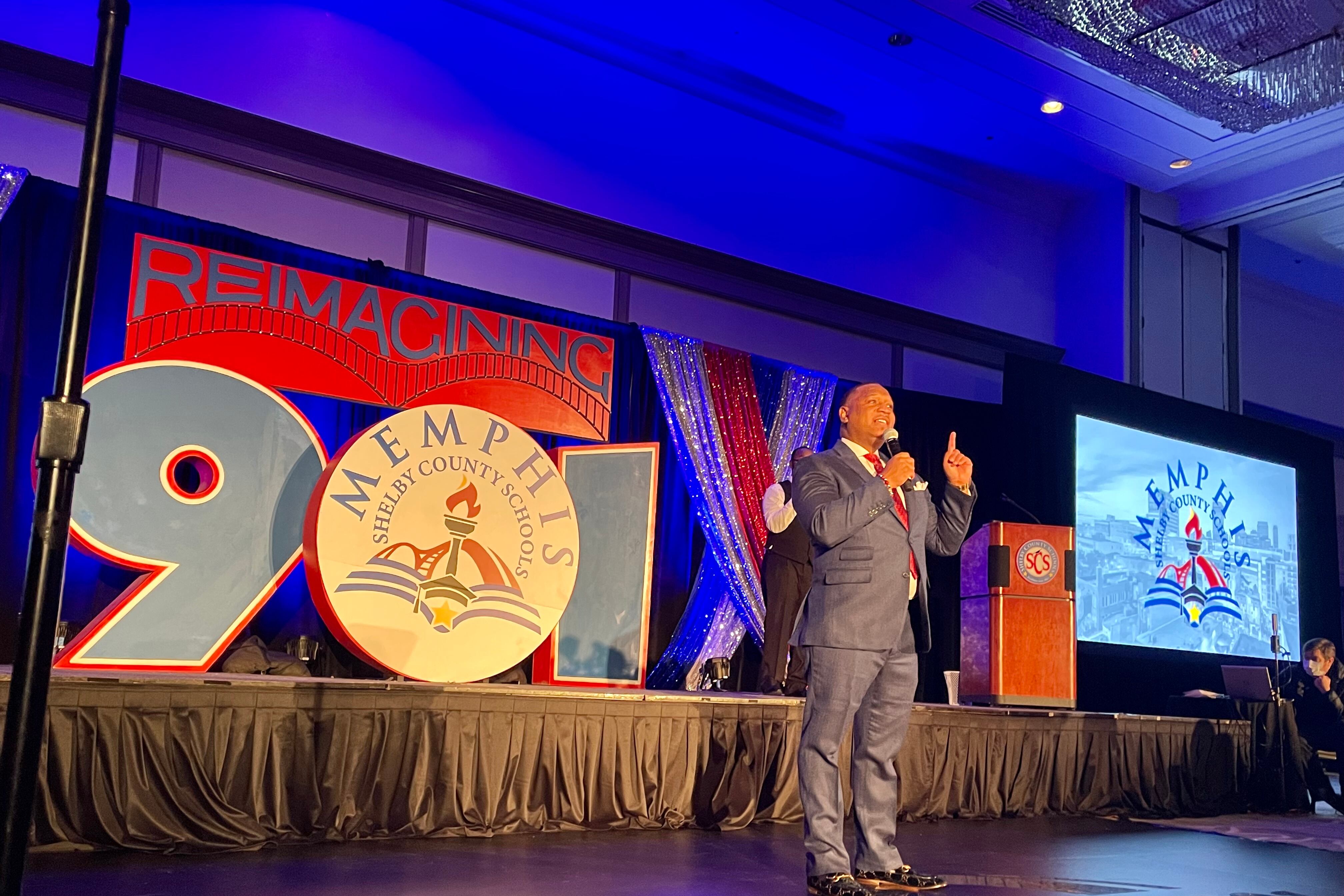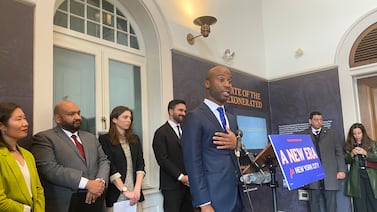As Memphis-Shelby County Schools heads into the second year of its quest to “reimagine education,” Tennessee’s largest school district will offer teacher bonuses and boost staff health care coverage, create a hands-on internship program for 1,000 juniors and seniors, and explore a year-round school calendar.
Superintendent Joris Ray announced the initiatives Wednesday morning at an extravagant state of the district event at the Hilton in East Memphis featuring a live band and singers, radio DJ Stan Bell as the emcee, and plenty of red, white, and blue flowers and balloons.
He also announced the district will continue to focus on boosting early literacy, recruiting and retaining high-quality teachers, and reducing the student-adult ratio in grades K-2, among other initiatives.
Referencing his visit to Nashville last week for the School Superintendents Association’s National Conference on Education, Ray described the many “beautiful buildings” he saw springing up in the state’s capital city and the positive attitude of many in the city, saying it exemplified Nashville’s goal to “move forward together.”
Ray said the same kind of revitalization and growth is possible in Memphis if the community moves forward together to help Memphis-Shelby County Schools continue improving public education — what he called “the great equalizer.”
“This is not out of our reach … We have the recipe to be stronger together,” he told the crowd of hundreds of district staff, community leaders, school board members, and other elected officials. “The business of education is your business. It’s everybody’s business. We must make education our priority investment together.”
Ray also touted progress toward other efforts since his last state of the district presentation in April 2021, including:
- Expanding before and after-school tutoring to reach 9,000 students this school year.
- Improving facilities by spending $171 million on HVAC upgrades, building and gym additions, stadium and paving improvements, and fire safety systems.
- Consolidating schools with millions of dollars of deferred maintenance amid declining enrollment.
- Growing world language programming from five elementary schools to 40 in a phased approach.
- Forging partnerships with organizations like First 8 Memphis and the Urban Child Institute to lift early childhood literacy.
- Increasing access to advanced academics by offering 33 more dual credit courses in the last year, as well as offering honors courses at all district-managed middle and high schools and Advanced Placement courses at 96% of high schools.
He also highlighted the school board’s recent unanimous decision to rebrand the district to Memphis-Shelby Schools and unveiled the district’s new logo. Ray said he believes changing the district’s name to be more reflective of the community will instill pride among students and all Memphians.
COVID challenges, teacher shortages drive pay boost
Ray’s Wednesday address comes as the district and others across the country continue to face pandemic challenges, from operating schools in-person as safely as possible and battling to recover from learning loss after months of virtual learning, to ongoing teacher and school staff shortages worsened by COVID.
Schools across the U.S. have been challenged to fill open positions for over a decade, and in Tennessee alone, the number of educators graduating from teacher training programs has dropped by nearly one-fifth over five years, according to a recent report.
Amid the ongoing hurdles and elevated stress of the pandemic, experts worry the lack of educators and school staff will continue to worsen. Since the beginning of the pandemic, state and local public education employment fell by nearly 5% overall — and by almost 7% among just K-12 teachers — according to the EPI report.
A 2021 survey by the RAND Corporation found that teachers are nearly twice as likely as other employed adults to experience frequent job-related stress, and they’re nearly three times more likely to experience symptoms of depression. In January, a National Education Association poll revealed that over half of the members of the nation’s largest teachers union are considering leaving teaching sooner than they’d expected.
After Memphis-Shelby County Schools reported having 200-plus teaching positions open in the fall, up from 63, and given the many strains teachers continue to grapple with, district officials decided to make teacher retention bonuses a priority, Ray said.
For the 2022-23 school year, the district will invest $11 million in its teachers by paying $1,500 retention bonuses for teachers and a $500 bonus for educational assistants. Also next year, the district will pour $11 million more into teachers’ tiered pay scale, and add a new principal step in the pay scale. The district also plans to spend $3 million to increase the district’s health insurance coverage to 70%.
District officials hope the moves will not only encourage teachers to stay in their jobs, but also encourage others to pursue a career in education.
Calling Wednesday a “great day for educators and students,” Danette Stokes, president of Memphis’ United Education Association, said in a tweet that the initiatives were the result of months of collaboration to increase teacher compensation. In another tweet, she thanked Ray and other administrators for listening to teacher and principal voices.
Ray repeatedly touted the district’s progress in decreasing the student-adult ratio in kindergarten through second grade classrooms by hiring 750 specialized education assistants to help teachers with classroom tasks so they can focus on instruction.
Ray also acknowledged that the pandemic has hampered those efforts. When the omicron variant surged in Memphis last month, it was common for support staff to step in for teachers, or for two or three classrooms to be combined in a larger space like a cafeteria or auditorium.
Ray pointed out that all district-managed schools remained open.
“When you’re a principal in the school, it’s about educating students, but sometimes it’s also about just having a body with students,” Ray said. “With the labor shortage, our SEAs wear two hats sometimes. They’re in our K-2 classes, but if they’re needed in other classes to help fill that void, they’re doing just that.”

District to ‘explore’ year-round school
While boosting teacher recruitment and retention is central to Ray’s plans he also touted several new student-centered initiatives focused on recovering from pandemic learning loss.
A year-round school calendar could be one such solution, Ray said, suggesting it could prevent the summer academic slide and give students more time in the classroom to focus on literacy and math.
While most U.S. schools follow the traditional nine-month calendar, year-round calendars have gained support in recent years, especially in districts that serve predominantly low-income students. Former Superintendent Dorsey Hopson originally floated the idea for year-round school in 2017.
Students living in poverty are more likely than their more affluent peers to fall behind academically during long summer breaks, according to the National Summer Learning Association. In Memphis, nearly 60% of students are considered economically disadvantaged.
On Wednesday, Ray was quick to emphasize “before I start getting tomatoes thrown at me” that the district is only exploring the idea and students would still have several 2-4 week breaks. Ray wouldn’t give a start date for year-round school, saying the district has a lot more research to do.
Regardless, Ray said any change in the length of the academic year would come with another boost to teacher pay.
“We can’t do this work without them,” he said.
Other district efforts to bolster college and career readiness include automatically enrolling all qualified seventh through 12th grade students in honors English, math, and science classes, an initiative Ray said may recruit students who would not otherwise have enrolled.
The district also highlighted the launch of the “Power 1,000” internship program, which will allow high school juniors and seniors work for district leaders and corporate partners for up to 10 hours a week. Not only would students gain valuable experience outside the classroom, but the jobs would pay above minimum wage, Ray said.
Speaking with reporters after the event, Memphis-Shelby County Schools board Chair Michelle McKissack said she’s walking away with a sense of hope, particularly in terms of addressing early childhood literacy and using ESSER funding for expenditures like expanded tutoring and much-needed facilities upgrades.
“For the first time in a long time, we’ve got some footing,” she said. “We’ve got money that we’ve never had before to make a difference academically and in buildings.”
A day before the state releases a new proposal for how to fund K-12 schools, Ray emphasized that after years of being underfunded, large urban districts like Memphis are going to need a long-term funding boost as they attempt to bounce back from the pandemic and, overall, improve public education.
When he drives around other communities near Memphis that are not chronically underfunded, Ray can’t help but notice “nice, beautiful” school buildings and sports fields.
“I want the same thing for our children in Memphis-Shelby County. I want the best for our children — that’s what dreaming big is all about, he said. “But these things cost money.”
Samantha West is a reporter for Chalkbeat Tennessee, where she covers K-12 education in Memphis. Connect with Samantha at swest@chalkbeat.org.






